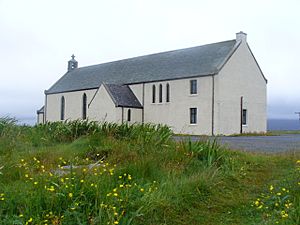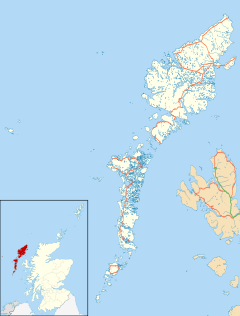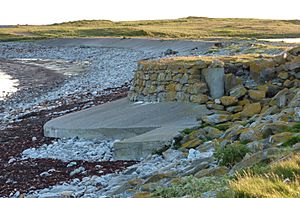Bornish facts for kids
Quick facts for kids Bornish
|
|
|---|---|
 Saint Mary's Church, Bornish |
|
| Language | Scottish Gaelic English |
| OS grid reference | NF739298 |
| Council area | |
| Lieutenancy area | |
| Country | Scotland |
| Sovereign state | United Kingdom |
| Post town | ISLE OF SOUTH UIST |
| Postcode district | HS8 |
| Dialling code | 01878 |
| Police | Northern |
| Fire | Highlands and Islands |
| Ambulance | Scottish |
| EU Parliament | Scotland |
| UK Parliament |
|
| Scottish Parliament |
|
Bornish (Scottish Gaelic: Bòrnais) is a small village in Scotland. It's located on an island called South Uist. This island is part of the Outer Hebrides, a group of islands off the west coast of Scotland. Bornish is also a "community council" area. This means local people have a say in how their area is run. A main road, the A865, goes right through Bornish. This road connects two other places, Lochmaddy and Lochboisdale.
Contents
Exploring Bornish's Past
Bornish has a very long and interesting history. People have lived here for thousands of years. We can learn about their lives by looking at old buildings and things they left behind.
Ancient Buildings: Dun Vulan Broch
Near Bornish, there's an old building called Dun Vulan broch. A broch is a type of ancient stone tower. This one was built a very long time ago, between 150 and 50 BC. That's over 2,000 years ago!
It was built right on the coast. When it was new, it stood about 10 meters (33 feet) tall. Today, its walls are about 1.5 meters (5 feet) high. Later, another group of people called the Picts built a house inside the old broch walls.
Viking Life in Bornish
Scientists have dug up an old Norse settlement near Bornish. The Norse people are also known as Vikings. These digs have taught us a lot about how Vikings lived here.
- Farming: It seems that pigs were very important to Viking farmers. They might have been more important than in other places.
- Hunting: Vikings might have managed the number of red deer in the area. This means they didn't just hunt them randomly.
- Fishing: Catching herring became a big business for them.
- Trade: They traded with other places far away. These included cities like Dublin and Bristol.
Scientists found coins from Norway, Germany (Westphalia), and England. But they didn't find any coins from Scotland! They also found ivory that came all the way from Greenland.
How People Paid Taxes
The islands of the Hebrides used a special tax system. It was called the Ounceland system. What scientists found at Bornish suggests something interesting. The families living here might have been richer than similar families in the Northern Isles. This could be because the rulers in Bornish were less strict.
 | James B. Knighten |
 | Azellia White |
 | Willa Brown |



